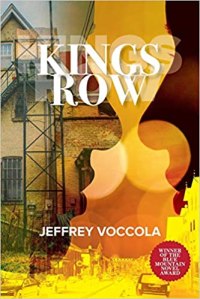We’re excited to name the winner of the most recent round of our Eludia Award: Elisabeth Bell Carroll of Framingham, Massachusetts, for her fascinating dual-time novel, Agnès & Oscara.
The Eludia Award is a first-book award, offered to a woman writer, age forty and above, for a work of fiction, either a novel or collection of stories. We are also pleased to announce the semi-finalists and finalists below and wish to congratulate everyone. As ever, we are in awe of the enormity of talent we receive; and we are grateful to every writer who has submitted to this award.
The next round of submissions for the Eludia Award will deadline April 1, 2024. More details about The Eludia Award, and its guidelines can be read here on our blog, and here, on the Submittable page.
The semi-finalists and finalists are as follows:
Semi finalists
Adams, Kate, Mountain View, California, Scattered Pieces
Alderton, Ellen, Washington, D.C., Changing of the Guard
Alpha, Karen, Corning, New York, ZULU And Other Stories
Bryan, Cristina, Durham, North Carolina, Henricus
Carter, Thatcher, Riverside, California, Razed
Carroll, Elisabeth Bell, Framingham, Massachusetts, Agnès & Oscara
Chilton, Lora, Memphis, Tennessee, Massacre in 1666
Clayton, Julia, Southport, Merseyside, England, Tinted Venus
Colvin, Rebecca, Gastonia, North Carolina, A Beautiful Symmetry
Crawley, Kathryn, Greensboro, North Carolina, The Fetch of the Wind
Debling, Heather, Stratford, Ontario, Canada, Count Your Blessings: Stories
De Gregorio, Karen, Sherman Oaks, California, The Carnaval Kara Never Danced
Dhavan, Lucinda, Concord, Massachusetts, A Part of It All
Feighan, Philomena, Westborough, Massachusetts, Long Sleeps the Summer in the Seeds
Gorelova, Linda, Columbus, Ohio, The Romanovs Wish You Health in the New Year
Gray, Katrine, El Sobrante, California, Crescent Lane
Gurman, Diana, Los Angeles, My Ghost and Other Stories
James, Frannie, Seattle, Washington, The Sylvan Hotel, a Seattle Story
Johnson, Lulu, Dillard, Georgia, Pandora’s Portrait
Juchniewicz, Melissa, Chester, New Hampshire, Like Dust
Kirkham, Phebe, Woodside, New York, The Last of the Winters
Lawhorn, Barbara, Macomb, Illinois, Born Again
Lownds, Joan, Naugatuck, Connecticut, What’s Wrong with Your Voice?
Marin, Robin Luce, Brooklyn, New York, Old Scores
Martinez, Suzanne, Brooklyn, New York, Down Under the Manhattan Bridge Overpass
May, Amber, Sherwood, Arizona, Destiny Keeper
Moriarty, Marilyn, Roanoke, Virginia, Flight Is the Name of a Goddess
Neville, Sophie, Lymington, Hampshire, UK, Love Is For The Brave
O’Brien, Colleen, East Glacier, Montana, Baited
Oxnard, K.W., Savannah, Georgia, The Leg in Question
Palmer, Wendy, Oak Bluffs, Massachusetts, Sphere of Her Own
Payne, Martha, Atlanta, Georgia, Apple Doll
Ruby, Michele, Louisville, Kentucky, Stage Presence
Smith, Jessica, Lewiston, Maine, That Kind of Trouble Isn’t This Kind of Trouble
Spasser, Connie Corzilius, Augusta, Georgia, Shimmer and Give: Stories
Taugher, Mary, San Francisco, California, What Mercy
Troisi, Gina, Eliot, Maine, After the Rush
Webb, Susan, Citrus Heights, California, Figments
Whouley, Kate, Centerville, Massachusetts, The Maestro and Her Protégé
Wood, Mary, Eugene, Oregon, The Blue Edge
Yackzan, Dawn, Davis, California, Leap Frog
Finalists
Adams, Kate, Mountain View, California, Scattered Pieces
Alderton, Ellen, Washington, D.C., Changing of the Guard
Bryan, Cristina, Durham, North Carolina, Henricus
Carroll, Elisabeth Bell, Framingham, Massachusetts, Agnès & Oscara
Chilton, Lora, Memphis, Tennessee, Massacre in 1666
Clayton, Julia, Southport, Merseyside, England, Tinted Venus
Crawley, Kathryn, Greensboro, North Carolina, The Fetch of the Wind
Debling, Heather, Stratford, Ontario, Canada, Count Your Blessings: Stories
Gorelova, Linda, Columbus, Ohio, The Romanovs Wish You Health in the New Year
Gray, Katrine, El Sobrante, California, Crescent Lane
Gurman, Diana, Los Angeles, My Ghost and Other Stories
Johnson, Lulu, Dillard, Georgia, Pandora’s Portrait
May, Amber, Sherwood, Arizona, Destiny Keeper
Moriarty, Marilyn, Roanoke, Virginia, Flight Is the Name of a Goddess
O’Brien, Colleen, East Glacier, Montana, Baited
Oxnard, K.W., Savannah, Georgia, The Leg in Question
Payne, Martha, Atlanta, Georgia, Apple Doll
Spasser, Connie Corzilius, Augusta, Georgia, Shimmer and Give: Stories
Whouley, Kate, Centerville, Massachusetts, The Maestro and Her Protégé
Winner
Carroll, Elisabeth Bell, Framingham, Massachusetts, Agnès & Oscara
Again, we would like to express our undying appreciation and respect for all who submitted to The Eludia Award. Thank you for your patience, and for entrusting your work to us. We love and honor each and every one of you!






